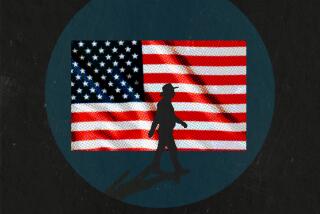Column: Chicanos vs. Traditionalists
Last Saturday’s Chicano Moratorium and the activities of Catolicos por La Raza dramatize the gulf which exists between the traditional-minded Mexican-Americans and the young activists.
Unless this is understood, observers can fall easily into the simplistic conclusions that the traditionalists are Tio Tacos (Uncle Toms) or that the activists are irresponsible punks.
Either conclusion misses the essence of the present Mexican-American condition.
Traditional-minded Mexican-Americans blush at the mention of the word Chicano. They blanch at the thought of being called brown people. The reason for this, outside of personal views, is the psychological makeup of the Mexican in general.
Octavio Paz, the Mexican poet-essayist-diplomat, has tried to explain it this way: “The Mexican, whether young or old, white or brown, general or lawyer, seems to me to be a person who shuts himself away to protect himself ... He is jealous of his privacy and that of others ... He passes through life like a man who has been flayed; everything can hurt him, including words and the very suspicion of words ...”
The Mexican, says Paz, “builds a wall of indifference and remoteness between reality and himself, a wall that is no less impenetrable for being invisible. The Mexican is always remote, from the world and from other people. And also from himself.”
It is any wonder, then, that the more conservative Mexican-Americans—and there are many of them—are embarrassed and angered at Chicanos (suspicious word) who say they don’t want to fight the war in Vietnam and Catolicos who are questioning the church and the world about them?
The Mexican, says Paz, wears his face as a mask and believes “that opening oneself up is a weakness or a betrayal.”
The Chicano activists are trying to rid themselves of their masks and to open themselves to themselves and to others. It is significant that in doing this they should pick as a means the Vietnam war and the Catholic Church.
That more than 3,000 people braved torrential rains last Saturday to participate in the Chicano Moratorium is important not because so many people showed distaste for the war—Anglos have done this in a bigger way—but because it was Mexican-Americans who did it.
Mexican-Americans, who include a disproportionate number of Medal of Honor winners and who, like the blacks, are suffering a disproportionate number of deaths in Vietnam, had up to now fought our wars without question.
It was part of the “machismo” tradition. When called to war, Mexican-Americans showed everyone how “macho” or manly they were and never questioned the justification for the war.
Mexicans, says Paz, judge manliness according to their “invulnerability to enemy arms or the impacts of the outside world. Stoicism is the most exalted of (Mexicans’) military and political attributes.”
The Chicano Moratorium strove to end this stoicism, which is hardly a democratic attribute.
“We weren’t shedding our machismo,” said a young marcher. “We were proving our machismo by asking the establishment the tough question: ‘Why are we dying overseas when the real struggle is at home?’”
When the Catolicos por La Raza demonstrated during a midnight Christmas mass last year, they were also breaking with tradition and asking tough questions at the cost of going through the ordeal of being tried for disturbing the peace.
A San Antonio teacher, testifying before the U.S. Commission on Civil Rights last year, said he has noted that the difference between Anglo and Mexican-American students is that when “some situation befalls the Mexican-American,” the Mexican-American tends to leave things up to God while the Anglo tries to solve it on his own.
Catolicos por La Raza, who greatly embarrassed the traditional-minded Mexican-Americans by their questioning of the Catholic Church’s relevance to present society, were breaking with this concept.
Chicanos and traditional-minded Mexican-Americans are suffering from the ever-present communications gap. Traditionalists, more concerned with, to them, chafing terms like Chicano, are not really listening to what the activists are saying. And the activists forget that tradition is hard to kill.
More to Read
Sign up for Essential California
The most important California stories and recommendations in your inbox every morning.
You may occasionally receive promotional content from the Los Angeles Times.











